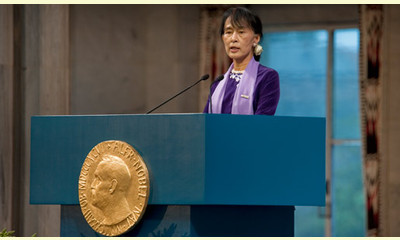|
|
Aung San Suu Kyi: speech to the Nobel Prize Comittee
an article by Aung San Suu Kyi
Video: Aung San Suu Kyi
[Editor's note: Here are some excerpts from the address by Aung San Suu Kyi to the Nobel Prize Comittee on June 16, 2012 in Oslo, Norway. The full text is available in the discussion for this article.]

Aung San Suu Kyi delivering her Nobel Lecture in the Oslo City Hall, 16 June, 2012.
click on photo to enlarge
. . . We are fortunate to be living in an age when social welfare and humanitarian assistance are recognized not only as desirable but necessary. I am fortunate to be living in an age when the fate of prisoners of conscience anywhere has become the concern of peoples everywhere, an age when democracy and human rights are widely, even if not universally, accepted as the birthright of all. How often during my years under house arrest have I drawn strength from my favourite passages in the preamble to the Universal Declaration of Human Rights
* disregard and contempt for human rights have resulted in barbarous acts which have outraged the conscience of mankind, and the advent of a world in which human beings shall enjoy freedom of speech and belief and freedom from fear and want has been proclaimed as the highest aspirations of the common people,
* it is essential, if man is not to be compelled to have recourse, as a last resort, to rebellion against tyranny and oppression, that human rights should be protected by the rule of law . . .
If I am asked why I am fighting for human rights in Burma the above passages will provide the answer. If I am asked why I am fighting for democracy in Burma, it is because I believe that democratic institutions and practices are necessary for the guarantee of human rights.
Over the past year there have been signs that the endeavours of those who believe in democracy and human rights are beginning to bear fruit in Burma. There have been changes in a positive direction; steps towards democratization have been taken. If I advocate cautious optimism it is not because I do not have faith in the future but because I do not want to encourage blind faith. Without faith in the future, without the conviction that democratic values and fundamental human rights are not only necessary but possible for our society, our movement could not have been sustained throughout the destroying years. . . .
The peace of our world is indivisible. As long as negative forces are getting the better of positive forces anywhere, we are all at risk. . . .
Ultimately our aim should be to create a world free from the displaced, the homeless and the hopeless, a world of which each and every corner is a true sanctuary where the inhabitants will have the freedom and the capacity to live in peace. Every thought, every word, and every action that adds to the positive and the wholesome is a contribution to peace. Each and every one of us is capable of making such a contribution. Let us join hands to try to create a peaceful world where we can sleep in security and wake in happiness. . . .
|








|
DISCUSSION
Question(s) related to this article:
What is the state of human rights in the world today?,
* * * * *
Latest reader comment:
Each year we get overviews of the state of human rights in the world from Amnesty International and Human Rights Watch.

|
|









